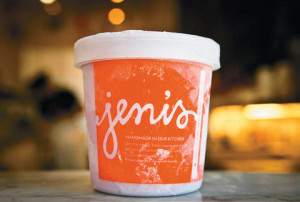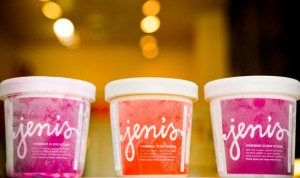According to the Charlotte Business Journal, Jeni’s Ice Cream is coming to North Carolina and bringing their fun flavors and tasty desserts. And raw milk?
Jeni’s Splendid Ice Creams is scooping up its signature gourmet ice cream and frozen yogurt in South End.
That roughly 1,000-square-foot boutique ice cream shop is located in the Design Center complex. It marks the brand’s first N.C. scoop shop — and 35th overall.
That spot just fit for the brand, says founder Jeni Britton Bauer.
Jeni’s sets itself apart with how its ice cream is prepared.
That means using raw milk, avoiding stabilizers and emulsifiers and using the best ingredients. For example, whiskey is distilled in the U.S., and the brand uses Fair Trade Chocolate and local ingredients when possible, such as fresh fruit or mint from the farmers market.
I tweeted at the @jenisicecreams handle looking for clarification. Have yet to hear what they mean by raw milk. I read it as unpasteurized milk goes into their ice cream. Other folks on Twitter have pointed out that it might just be marketing speak. Like ‘Hey, we make ice cream out of raw milk, well milk that starts raw, and then gets pasteurized.’
I don’t want to get into the raw milk choice debate here. You can check out Food Safety Talk 53: Raw Milk Hampsterdam for my thoughts on that.
Thanks to Dr. Tara Smith (@aetiology) on sleuthing this passage from the Jeni’s website where they talk about raw milk,
Dairy is the foundation of everything we do, so we use the best we can find. Smith’s, the 110-year-old dairy in Orrville, Ohio, has been sourcing raw cream and grass-grazed milk and pasteurizing it for us for the past couple of years. They work with small family farms within 200 miles of our kitchen.
Back to the Biz Journal article:
“Our ice creams really are fundamentally different from others,” she says.
If they make it with raw milk, yeah. And would be doing so illegally in NC. If they are talking about raw milk that becomes pasteurized before they get it, or they pasteurize it, then they are like pretty much every other ice cream processor in the U.S.
Update: Jeni’s (@jenisicecreams) tweeted back to me with this info:
our milk is pasteurized. When the cows’ raw milk and cream arrives at Smith’s, it’s pasteurized using our specific ingredients and recipe.
— Jeni’s Ice Creams (@jenisicecreams) July 30, 2018










